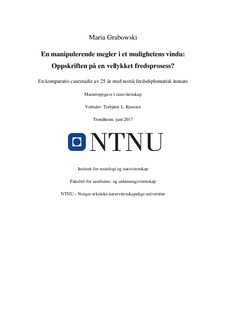| dc.description.abstract | This thesis is based on the need for a critical view and evaluation of 25 years with Norwegian third party mediation efforts from the beginning of the 1990s until today. Since the end of the Cold War, peace and reconciliation has been considered an important part of Norwegian foreign policy. From the beginning of the 1990s Norway started investing considerable resources in peace negotiations in distant intrastate conflicts, primarily as a facilitator between conflicted parties. The peace negotiations in Guatemala, Sri Lanka and the Balkans are among peace processes where Norway has played a key role during the negotiations. Even if Norwegian diplomats tend to highlight Norway’s accomplishments in these efforts, a closer look at the results of 25 years of Norwegian peace diplomacy however shows that the efforts by Norway alone is not necessarily sufficient to reach the goal of a final peace agreement. If a successful peace process is defined as a process where the result of the negotiations is a permanent and durable peace agreement, the processes based on Norwegian efforts have a significant lack of successful cases. Based on the same definition of a successful negotiation process, the Norwegian mediation efforts in the peace negotiations in Guatemala and the Balkans are considered as two successful cases. Sri Lanka, on the other hand, represents an unsuccessful case. An awareness about Norway’s strengths and weaknesses in these peace efforts can help developing certain conditions that are necessary for more successful outcomes in prospective peace negotiations where Norway is planning on playing a significant role as facilitator. The aim of this thesis is to find a recipe for such successful peace negotiations with Norway representing the role as a third party. Norway can play an important role as a facilitator in the preliminary phases of the negotiations, but a mediators need for significant political leverage and political power in the final phases seems crucial for a successful outcome and a final peace agreement. | nb_NO |
